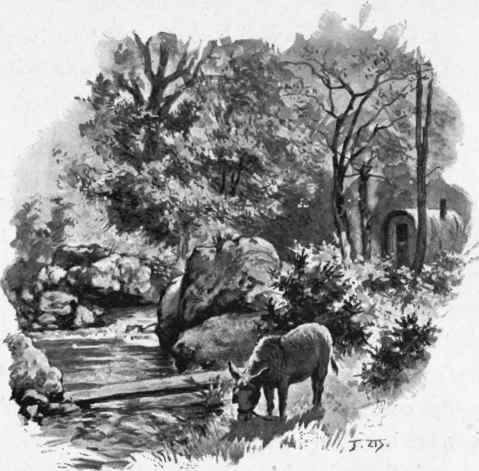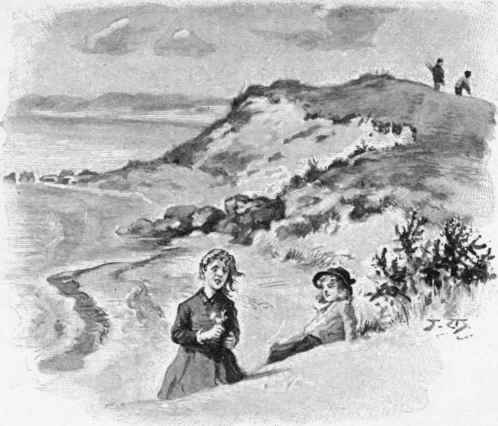In The Woodland. Continued
Description
This section is from the book "Wild Flowers Of Scotland", by J. H. Crawford. Also available from Amazon: Wild Flowers Of Scotland.
In The Woodland. Continued
Quite a jubilant shout summons me to the back of the wood, whither my companion has gone foraging on his own account. I find him lying all his length on the ground, gazing intently at something. It is quite an unconscious tribute, and all the more eloquent on that account, since he did not know what he was looking at, only that it was beautiful.
Twining in and out among the shrubs are certain pink branches, at first sight scarcely distinguishable from the blaeberry twigs, except from their habit of running long distances along the ground, instead of standing more or less erect in compact bushes. Every here and there, from these recumbent stems, rises a flower-stalk, suspending, some half a foot in the air, and clear above the blossoms of surrounding shrubs, two of the most delightfully shaded and shaped bells imaginable.
There is no mistaking this flower for a moment. No other approaches it in exquisiteness, except, perhaps, that second moorland plant, the bog pimpernel, and that only from a great distance. It is that which awakened the enthusiasm of the great botanist, and after him was called Linnoea borealis. Its presence is another sign of age. It is not uncommon in Scots woods that have been undisturbed. If only occasionally noticed, that is because it is so easily overlooked, even when in flower, by the unobservant. We swear a vow of secrecy over that Linnoea, because we know that many would be glad to take it away.
The trailing willow is all over the floor of the wood, lighting it up with its long yellow male catkins. A great space is beautified by the mountain globe flower, found in these patches, and not again till the mountains are reached. It is the largest, and certainly the most graceful, of our yellow wild flowers, with great soft balls of loosely incurved petals, as big as the closed hand of a lady.
At least four orchids grow in this wood - among them the rose-coloured, sweet-scented orchid, and that other with the black spots on the green leaves.
Moreover, the floor is inlaid all over with patines of bright silver, relieving the shades by countless stars. No flower, wild or cultivated, has the simple purity of the wood winter green.
Many of these, and more I could mention, are found all over the sub-alpine region of the hills, which extends upward for the first fifteen hundred feet.
The wood is a delightfully cool wood; that is the charm of it. It is worth climbing the ridge and getting heated in the July sun, just to plunge into it. It is like a water bath on a hot day, only infinitely more delicately tempered. It is not the shadow alone. Every wood has a shadow, and yet there are days when they are not cool. It is the moisture that is never absent from the air. Part of the floor is mossy and spongy. In winter one goes over the ankles there, and even in the height of a warm summer one always wets the sole of his boots.
These grey marshy stretches are relieved by the bright crimson and rose of the two louse worts, and diversified by the flat wan leaves of the butter-wort. There, too, rise the wax-like spikes of the round-leaved pyrola. Thus, these fir, beech, and oak trees cover over what, if exposed, would appear as moor and marsh, and be found to contain a fairly exhaustive representation of the characteristic flowers of both. The sundew is the only notable absentee.
The creepies of the gipsies, or, rather, tinkers, are visible on a bare place among the under-growth. These not altogether uninteresting survivors of a previous condition of existence, seem to have a partiality for the old woods. Their knowledge of the country is enviable, having been handed down from generation to generation. Many a hint have I got from seeing them turning up a pathway which seemed to lead to nowhere. I marked that way out for future investigation.
The donkey is luxuriating on the richest grass he can find, with an asinine contempt for absent thistles and present whins. Your donkey is an epicure, whatever people may say; and if he sometimes eats coarse food, it is because he is a philosopher as well, and takes what he can get without grumbling. By what sweet stream-sides and in what cool glades have I seen the gipsy's donkey grazing, while ordinary donkeys had to content themselves with the sparse dust-covered grass by the roadside. What an innocent face he has, almost touching in its rude gentleness !
"Poor Neddy! Poor Ned!" Open-mouthed, the gentle animal rushes at the well-meaning intruder, who is extremely relieved when he gets beyond the reach of his tether. Moral: Never trifle with gipsies' donkeys.

Just beyond the creepie the floor descends into a little cup, completely isolating one, even from the life of the surrounding wood. No fellow-loiterer can see down until he comes to the edge, and even then, he finds it hard to peer through the screen of branches. Unless he hears the voices, he may pass on, unaware that anyone is there.
In the centre of the cup, the autumn and winter rains form a pool, which persists through all but the driest summers. An accommodating willow has stretched a gnarled branch over the pool, whence, in comfort and safety, one can watch the water-beetles coming to the surface and bearing down with them their silver globule of air. From just beyond the wood comes the low of kine, and in the most out-of-the-way corner of the world nestles a farm, where lives a farmer's wife, who is seldom without, and never refuses, fresh milk and floury scones.
A month later, when all these waxen flowers have given place to berries, black and red, which happily occurs at school-holiday time, children's voices are heard in every part of the wood. Tired at length the young berry-hunters, with blackened faces, gather on the willow, and chatter among the branches like so many starlings or monkeys.
And when the sun begins to dip they fill their baskets, and leave only the lessening echoes of their retreating voices to die into the silence of the wood.

Continue to:


